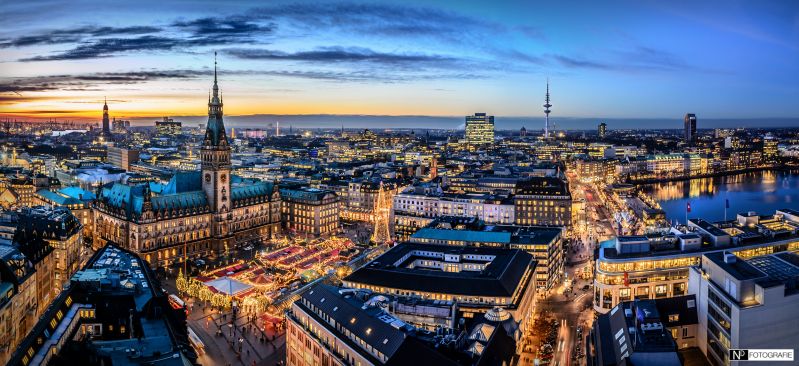Wastewater Becomes Resourcewater
Published on by Robert Brears, Founder of Our Future Water, Young Water Leaders, Mitidaption & Author (Springer Nature, Wiley) in Technology
A paradigm shift is required to stop viewing wastewater as a problem and instead see it as a resource that provides water, for both humans and nature, as well as energy and fertilizer.
One city that is leading the way in turning waste into a resource is Hamburg with the city’s utility, HAMBURG WASSER, setting the goal of closing the material and energy cycle with energy-saving technology.
20th-century wastewater management
Typically, wastewater passes through Hamburg’s 5,000-km long sewage system to the Köhlbrandhöft/Dradenau wastewater treatment plant. Because the domestic sewage is diluted with rainwater during its transport it makes it harder for the wastewater treatment plant to eliminate micro pollutants as well as recover nitrogen and phosphorous. As such, the diluted wastewater can only be cleaned by an energy-intensive process while most of the additional resources are lost.
When wastewater becomes resourcewater
Moving forwards, the HAMBURG WATER CYCLE (HWC) entails the separation of the material flows of wastewater: Blackwater (wastewater from toilets) is separated from the greywater (wastewater from kitchens, bathrooms and washing machines) while the rainwater is collected separately.
By separating the wastewater, it enables the efficient production of biogas from blackwater through fermentation. With the addition of other biomass, energy can be generated in the form of electricity for the operation of the energy-intensive wastewater treatment plant. Furthermore, after anaerobic treatment of this material, fertilizers can be created for use on agricultural fields.
Meanwhile, separated greywater can be cleaned with minimal energy consumption and either recycled for household use, such as watering the garden or flushing of toilets, or returned back to nature to replenish local waters.
Regarding stormwater, the HWC aims to manage stormwater onsite as naturally as possible so rainwater can be used for local purposes such as watering lawns. During heavy storm events, excess water will enter a variety of green infrastructural settings including retention ponds, where water either evaporates or eventually joins local waterways.

Piloting the Hamburg Water Cycle
The HWC is being implemented in two locations in Hamburg: One on a small scale and another on a larger scale. The Gut Karlshöhe project is a 9-acre environmental theme park created by the Hamburg Climate Protection Foundation for educational purposes. After the renovation of the barns on the premises, the site will serve as an HWC exhibition site to demonstrate both in theory and practice how new approaches to closing the loop, including turning waste into a resource, can be developed. One of the features of the site will be the development of a wetland for greywater purification. Overall, the site will provide comprehensive education for up to 140,000 people per year.
At a larger-scale, the HWC will also be implemented in Hamburg-Jenfeld as part of the Jenfelder Au project. Jenfelder Au is a residential area of around 35 acres that will house around 2,000 residents. The HWC will be implemented in approximately 630 residential units that in addition to separating out blackwater, greywater and stormwater will also have state-of-the-art vacuum toilets that reduce water usage in flushing by 80%, thereby ensuring blackwater remains as concentrated as possible for its use as a resource.
The take-out
The closing of the loop will remove the word ‘waste’ from our vocabulary so that everything becomes a resource.
*Robert C. Brears is the author of Urban Water Security (Wiley), which argues that cities need to transition from supply-side to demand-side management to achieve urban water security. This book provides readers with a series of in-depth case studies of leading developed cities, of differing climates, incomes and lifestyles from around the world, that have used demand management tools to modify the attitudes and behaviour of water users in an attempt to achieve urban water security.
Facebook: UrbanH20
Attached link
http://markandfocus.com/2017/02/15/wastewater-becomes-resourcewater/Media
Taxonomy
- Wastewater Use
- Nutrients Recovery
- Wastewater Collection
- Integrated Urban Water Management
- Integrated Water Management
- Urban Water
- Energy
- Water & Wastewater
- Nutrient Recovery & Reuse
- Waste Management